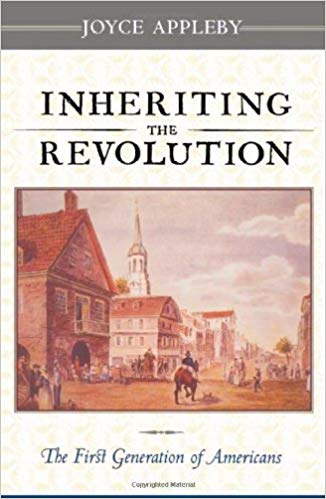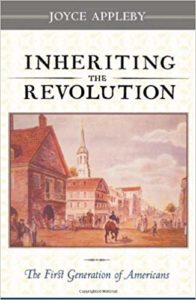Appleby’s Liberal America

Joyce Appleby’s Inheriting the Revolution is the boldest take on post-Revolutionary America to appear in some time. Hoping to capitalize on her earlier studies of the Jeffersonian Republicans and of the relationship between economic change and political thought during the late eighteenth century, Appleby must have known that, by the 1990s, no general interpretation could rest on politics or thought alone.1 So she sought out a different archive: the autobiographies left behind by those who had grown up in the wake of the Revolution. The title conveys an intentional double entendre: Appleby’s Americans did not fight the Revolution, nor apparently remember it, nor even spend much time celebrating or thinking about what had happened to the previous generation. Rather, they took the Revolution’s fruits–and ran toward a new future.
That future embraced, above all, prosperity and democracy as two sides of the same coin. The “autonomous individual” emerged as an actor and an ideal, and Appleby vividly stitches together the stories of a cohort of self-made men and women, many of whom rose from obscurity and disadvantage to positions of leadership. They invented new careers as doctors, teachers, writers, and evangelists; they took the distrust of established authority let loose by the Revolution, and pushed forward by the Jeffersonians in the realm of politics, into the large playing field of the social. Because the book self-consciously “follows the trajectory of liberal society fashioned in the first generation,” politics here is mainly about origins. Afficionados of political history may be disappointed, but Appleby does provide as useful an explanation as we have of how and why the battle between the Federalists and the Jeffersonians became a real social struggle, and a culture war. She goes so far as to say that by 1800, the “national elite” had, in fact, “been ousted.” With the ordinary people unleashed and limited government ratified, politics became an enabling force rather than a separate realm. As in many recent narratives of the early republic, political struggles themselves are then left behind as successive chapters move into the flowering of “enterprise,” the elaboration of “careers,” the thinning out of social “distinctions,” the new premium placed on “intimate relations” in a mobile society, and the excitement of “reform” as a new kind of personal yet public enterprise.
Appleby is at her best when describing the generational tensions that emerged from her close attention to individual life choices. She details as few have before the ways in which changes in public culture provided possibilities for those inclined to set out on their own, whether as preachers, farmers, or politicians. She finds women doing almost as many new things as men, and stresses how free blacks joined in the practice of self-fashioning in the marketplace. (She has surprisingly little to say about their exploitation in that marketplace.) Publicity, particularly print, is a large part of the story, as it linked people together, provided means for actually and imaginatively criticizing authority, and itself epitomized the possibilities of self-improvement and education. Appleby’s privileged sources, the autobiographies, stand at the pinnacle of a generation’s creation and consumption of print. For the first time, then, the burgeoning scholarship on print culture in the eighteenth and nineteenth centuries has made its way into a major synthesis, occupying a central place as a causal force and as a narrative device. Refusing to get bogged down in the poetics and politics of printedness, however, Appleby employs other sources to supplement the details gleaned from memoirs, pausing occasionally to describe how the newspapers and books allowed individuals access to a wider world even while helping them stand alone.
And yet, for all her carefulness not to allow autobiographers to define the world, Appleby gives us an early republic defined mostly as we would expect the Northern middle class of 1850 to define it. She may differ from older accounts by crediting the earlier period (rather than the “Jacksonian” or “antebellum” eras) for originating Tocquevillian liberal America, but the picture is nonetheless the same: democratic politics and territorial expansion lead to a cornucopia of economic opportunity, levelling, individualism, religious creativity, and all manner of voluntary association. The Northern middle class was indeed in a position of cultural dominance in the nation by the time most of Appleby’s culture-heroes sat down long enough to tell their life stories. But dissenting voices get short shrift when they do not join in the general chorus. We do hear of a rising racism, yet critics of consensus like David Walker are more important as black self-made men than for what they actually said about America. Appleby is all too certain when she proclaims that democracy and the “culture of capitalism” inherently contradicted the persistence of slavery and the elaboration of racism. Her own solution to the American dilemma is exactly that of the Northern middle class circa 1850: she blames it on the South, where an alleged failure to embrace enterprise, the breakup of (white) extended families, and the diversion of capital from labor (slaves) to land, machinery, and paper, left that region backward-looking and lacking in the “cultural capital” so rapidly compounding up North.
Appleby follows an evocative literature on Southern difference, but her account ignores the equally impressive evidence that Southerners, elite and plebeian, not only defined themselves as quintesentially American but also embraced the market as willingly as anyone. The abolition of slavery in the North did create real differences, as did the mounting attack on slavery launched by abolitionists; but Appleby’s neglect of actual political struggles leads her to overestimate Nothern antislavery sentiment as a property of liberal capitalist culture, and to underestimate the rise of racism as an outgrowth of those same developments (not to mention of political union with slaveholders). This might seem like a side issue, but Appleby chooses, in the book’s final chapter, to hang her interpretation of “a new national identity” on the public triumph of a Northern belief in progress, and the cultural exile of nostalgic Southern planters and their yeoman allies from this heady mix of entrepreneurialism, evangelicalism, individualism, and materialism. While such an interpretation may help explain the coming of the Civil War, it reduces culture to political economy plus myth. It fails to get at the texture of the nationalism that did emerge after the Revolution, much less at how actual battles over the meaning of the Revolution, and not merely a consensus about that meaning, shaped public life before the Civil War. Sadly, it also makes the era’s voices of failure and disappointment, many of them recorded in other kinds of contemporary narratives, quite discordant–as they no doubt were to the successful autobiographers of antebellum America. Like the memoirs flooding our own literary marketplace, Inheriting the Revolution should be widely read, but with caution. 2
Notes
1. This despite the praise and prize heaped on Stanley Elkins and Eric McKitrick’s 1993 paean to the lost possibilities of The Age of Federalism (New York, 1993). Joyce Appleby, Capitalism and a New Social Order: The Republican Vision of the 1790s (New York, 1984); Appleby, Liberalism and Republicanism in the Historical Imagination (Cambridge, Mass., 1992).
2. For trenchant analyses of published stories of troubled (and exploited) Americans, genres Appleby seems to have ignored, see Ann Fabian, The Unvarnished Truth: Personal Narratives in Nineteenth-Century America (Berkeley, 2000); Shane White, “The Death of James Johnson,” American Quarterly 51 (Dec. 1999): 753-95; Alfred F. Young,The Shoemaker and the Tea Party: Memory and the American Revolution (Boston, 1999).
This article originally appeared in issue 1.1 (September, 2000).
David Waldstreicher is associate professor of history at the University of Notre Dame and is the author of In the Midst of Perpetual Fetes: The Making of American Nationalism, 1776-1820 (1997).
